Fundamentals and Basic Concepts
Language Basics and History
- What is C programming and why is it called a middle-level language?guvi+1
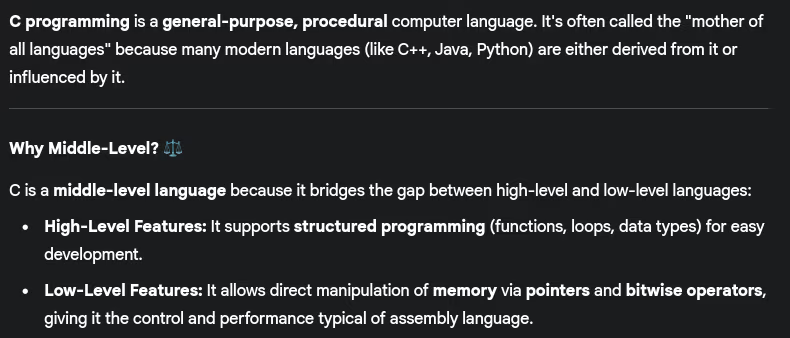
- Who developed C language and when? What was its original purpose?data-flair+1

- List and explain the features of C programming language.logicmojo+1
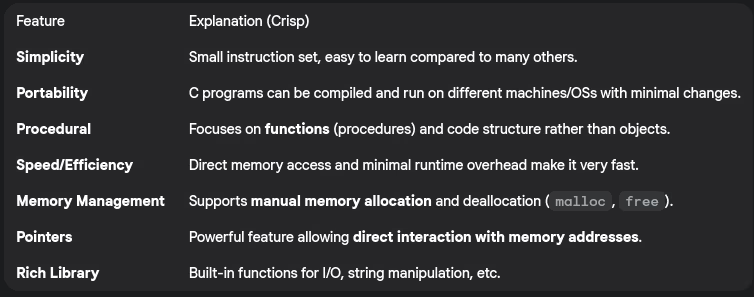
- How does C differ from other programming languages like Java, Python, or C++?
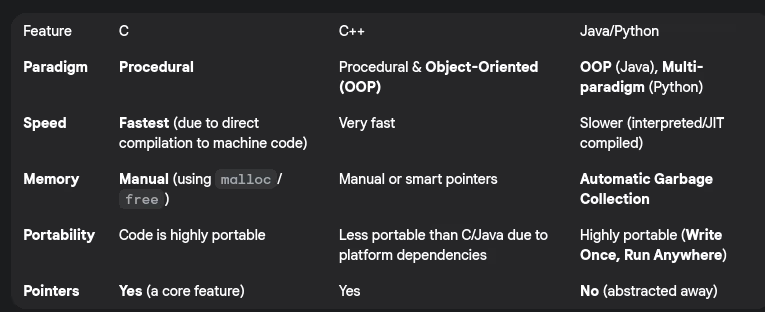
- What are the advantages and disadvantages of using C?
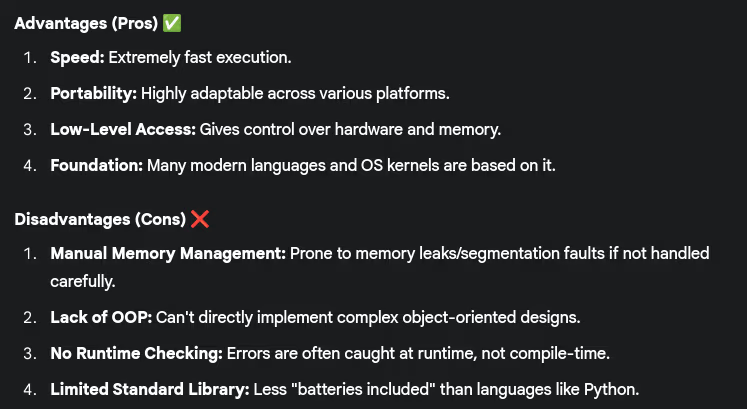
- Why is C still relevant in modern computing despite being decades old?
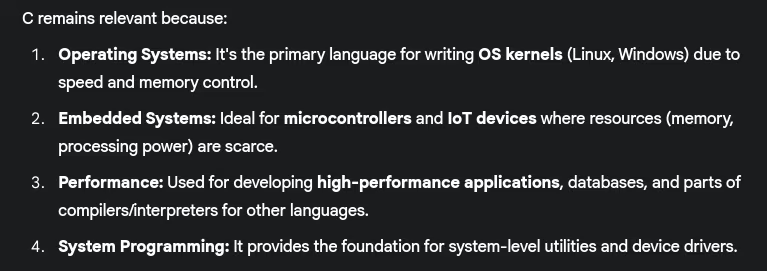
- What is the ANSI C standard and why is it important?

- Explain the relationship between C and UNIX operating system.

Basic Data Types and Variables
- What are the basic data types in C? Provide size and range for each.intellipaat+1
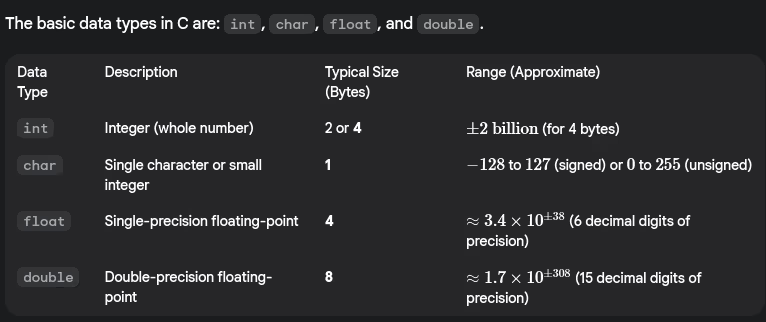
- Explain signed and unsigned data types with examples.simplilearn
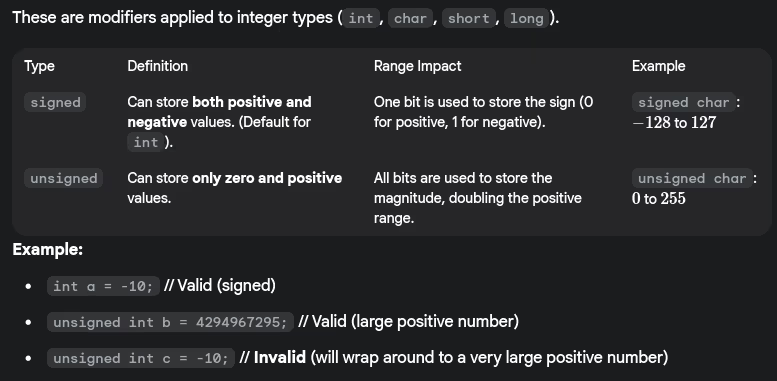
- What are short, long, signed, and unsigned modifiers?simplilearn
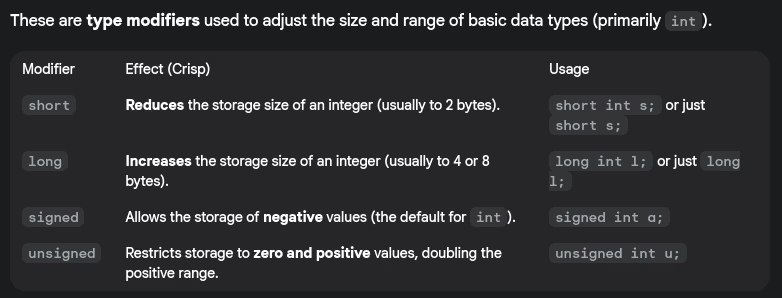
- How do you declare and initialize variables in C?
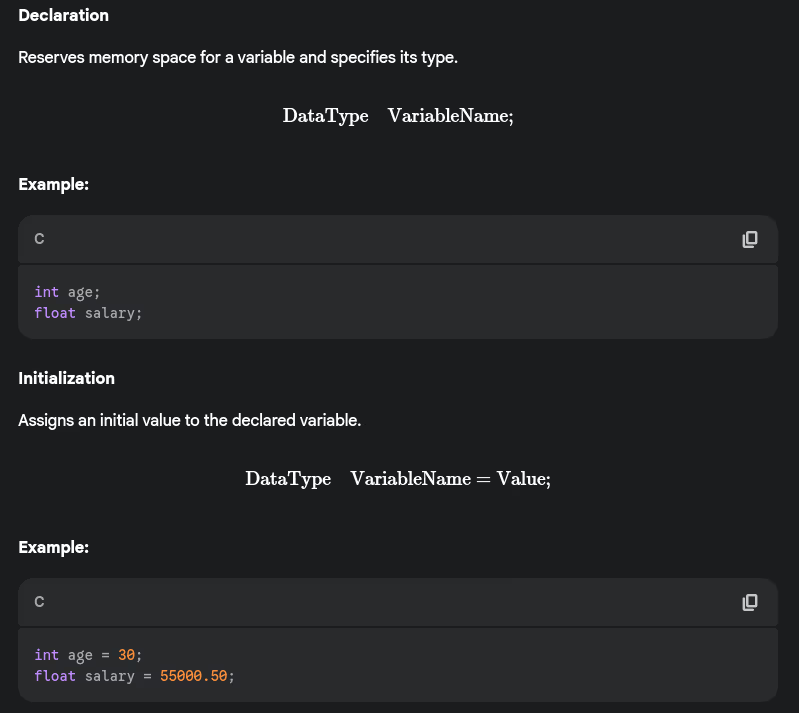
- What is the difference between a variable and a constant?indeed

- What are the rules for naming identifiers in C?
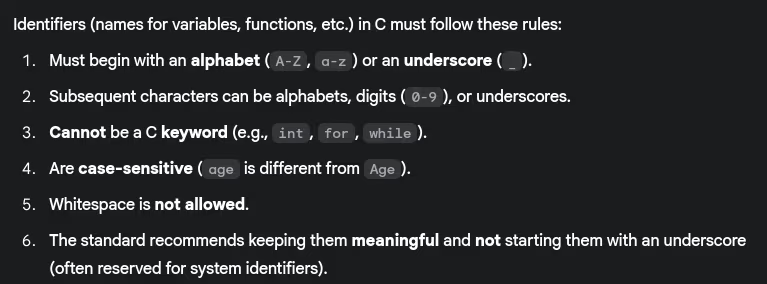
- What happens when you don’t initialize a variable?guvi

- Explain automatic type conversion and explicit type casting with examples.
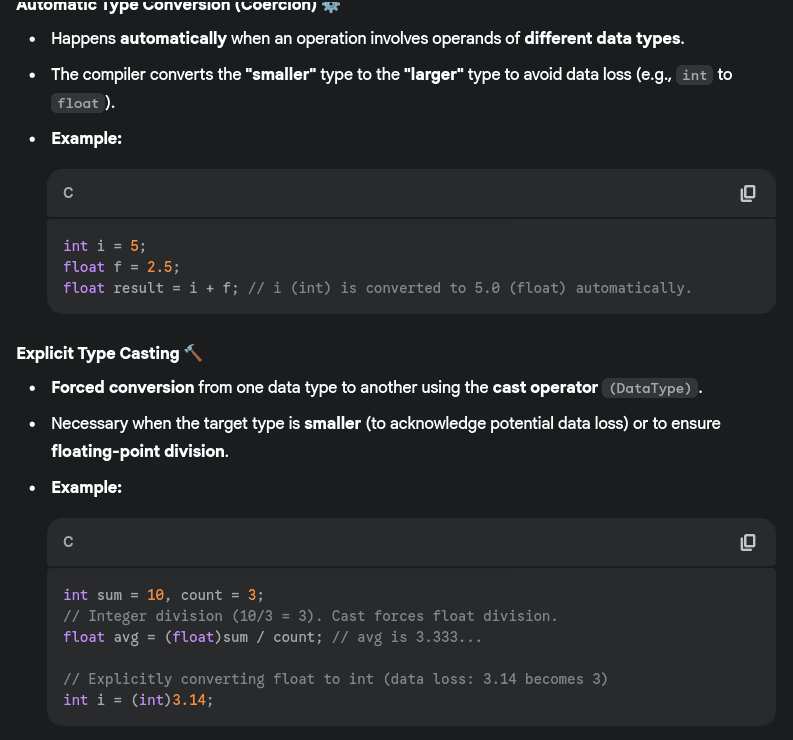
Keywords, Tokens, and Identifiers
- What are keywords in C? List some important keywords.interviewbit
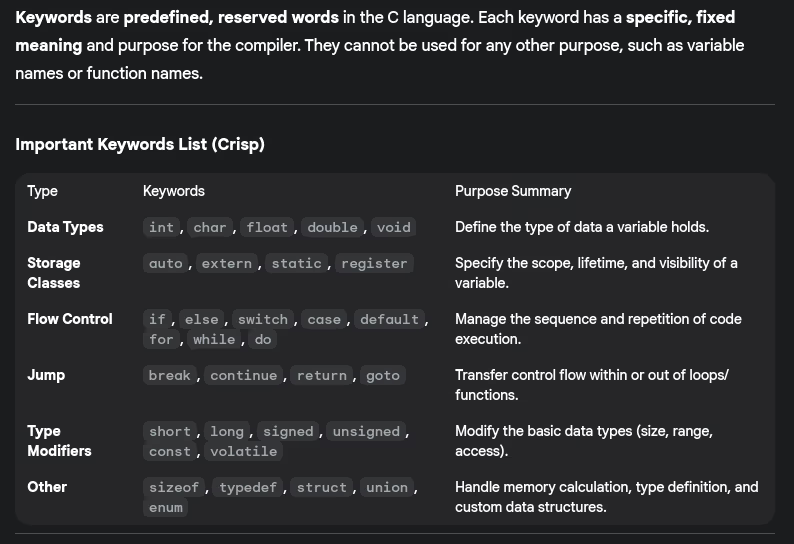
- What are the different types of tokens in C?interviewbit+1
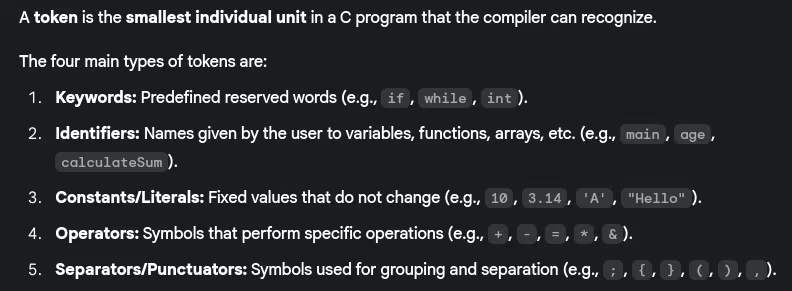
- Differentiate between keywords and identifiers.
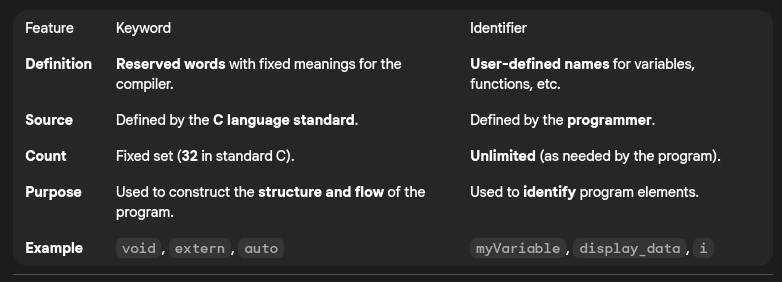
- What are reserved words in C programming?

- Can you use keywords as variable names? What happens if you try?
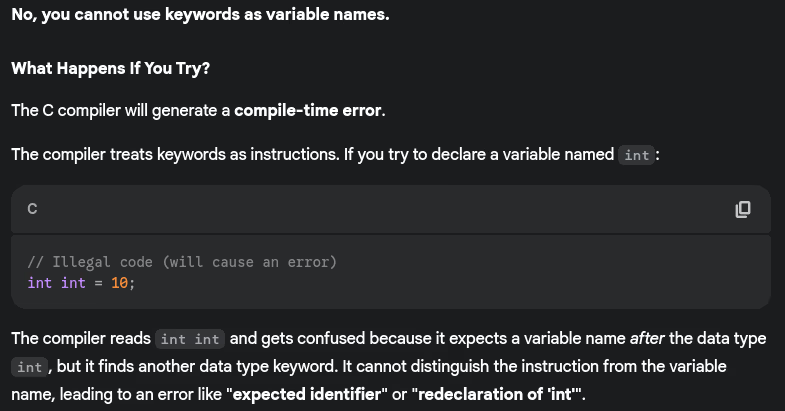
- What is the purpose of
printf() and scanf() functions?guvi+1 
- Explain different format specifiers with examples.interviewbit+1
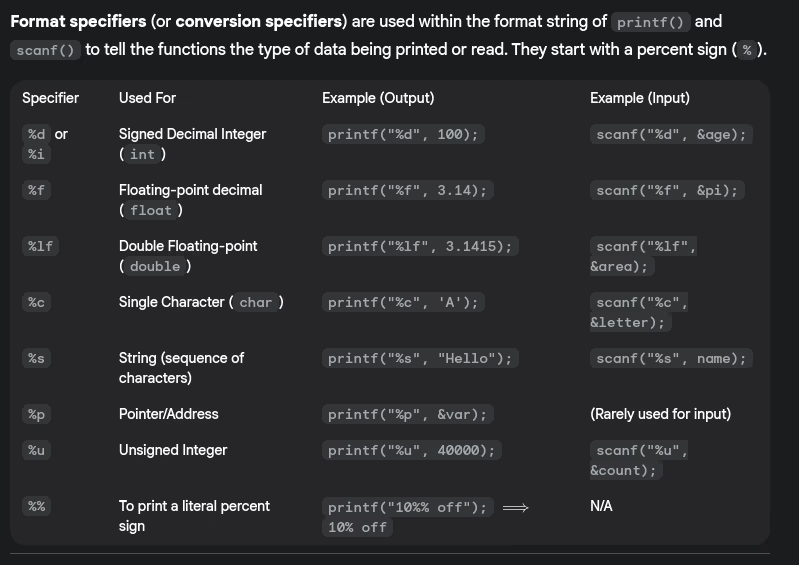
- What is the difference between
printf() and puts()? 
- How do you handle input validation in C?
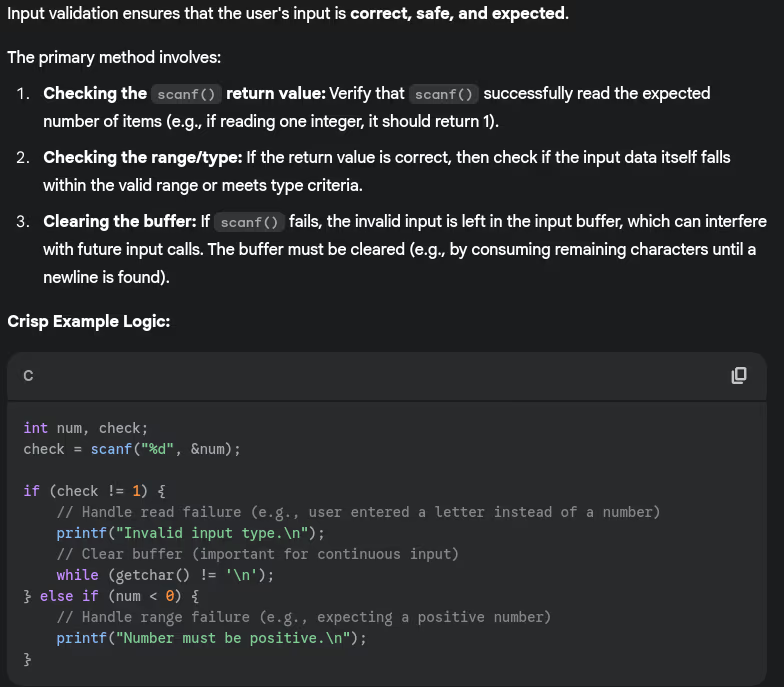
- What are the return values of
printf() and scanf()? 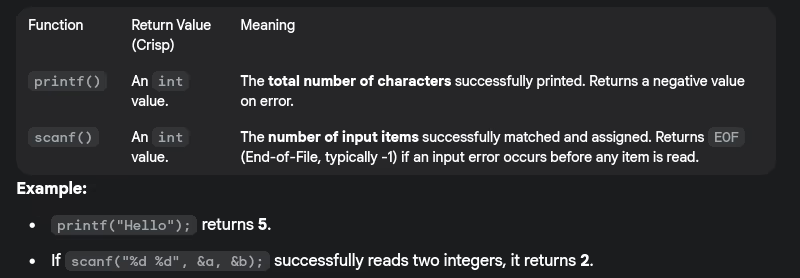
- Explain buffer overflow vulnerabilities in input functions.
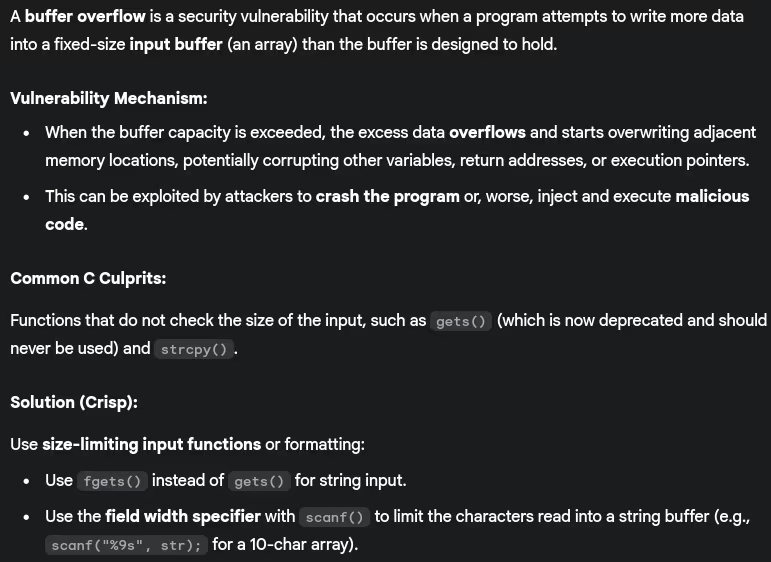
Operators and Expressions
Arithmetic And Assignment Operators
- Explain all arithmetic operators in C with examples.
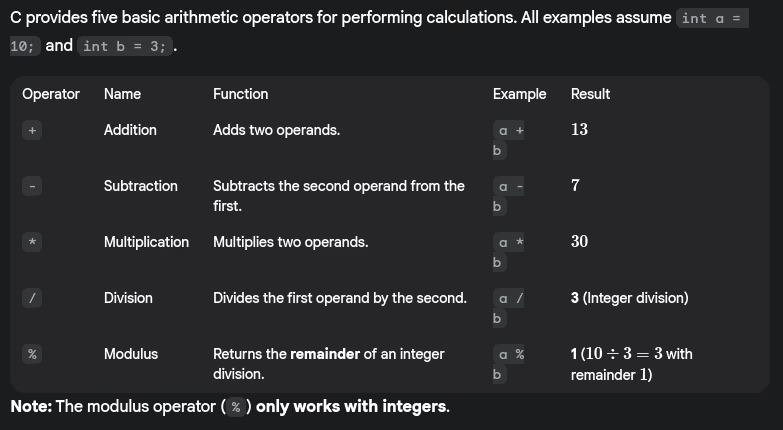
- What is the difference between
= and == operators?simplilearn 
- What are compound assignment operators?
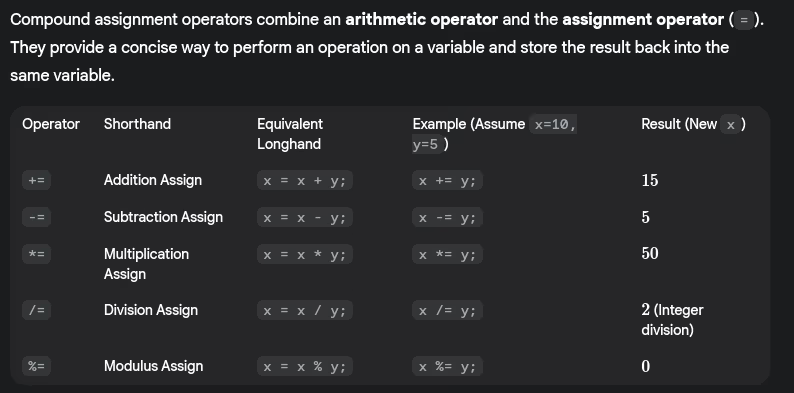
- How does integer division differ from float division in C?
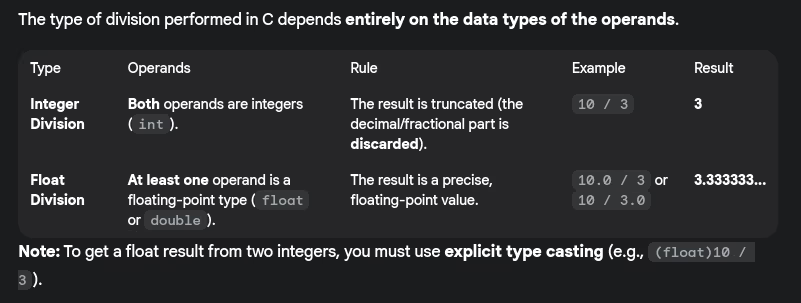
- What is operator precedence and associativity?
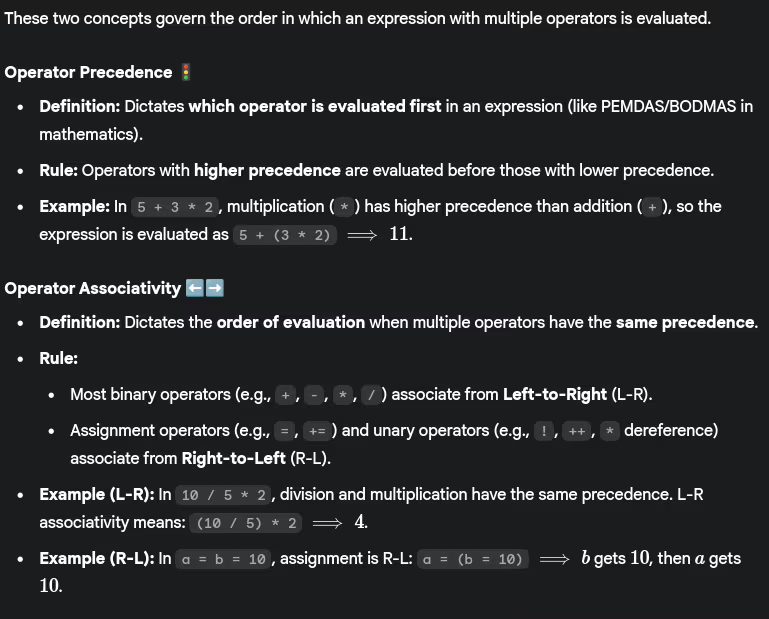
Increment And Decrement Operators
- What is the difference between
++i and i++?prepinsta 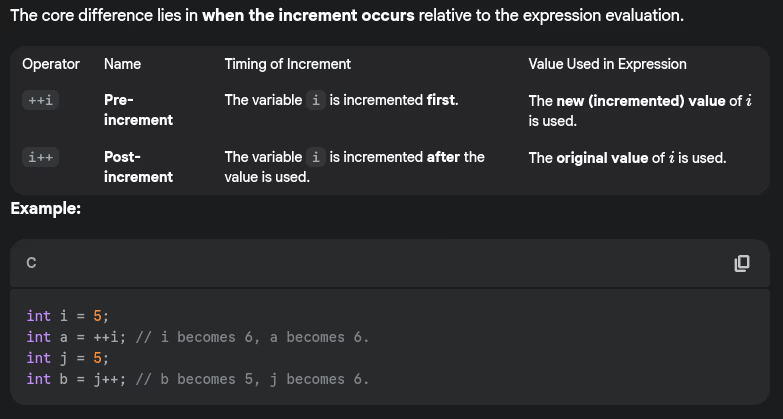
- What is the result of
x = 5; y = x++ + ++x - --x + x--?data-flair 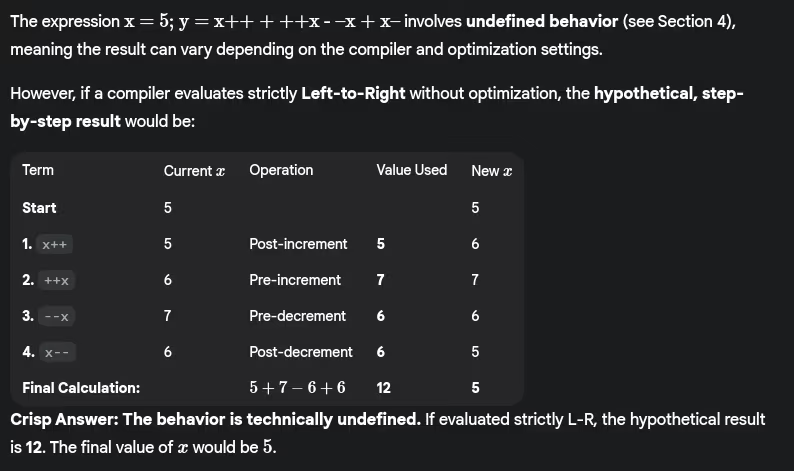
- Explain undefined behavior in increment/decrement operations.guvi
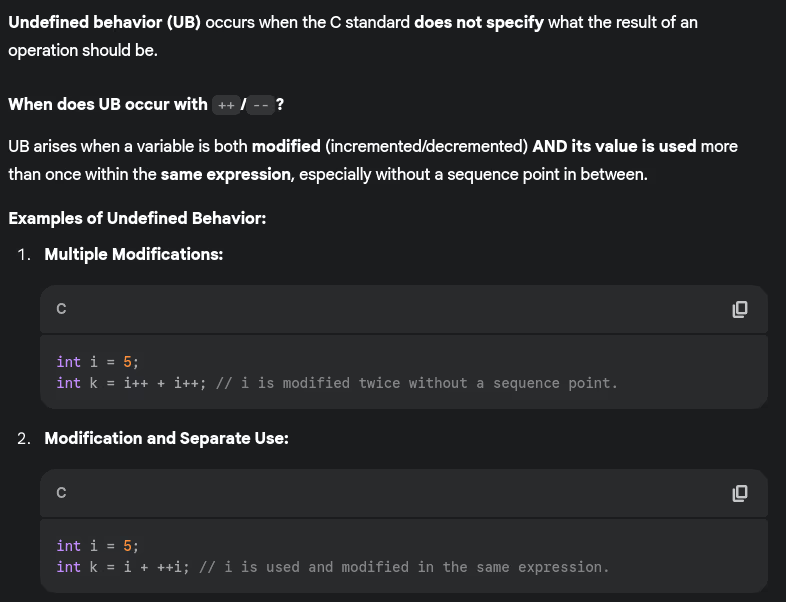
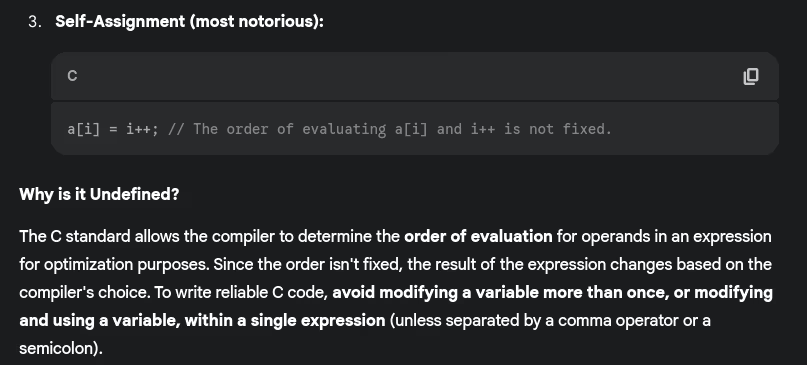
Relational And Logical Operators
- Explain all relational operators with examples.
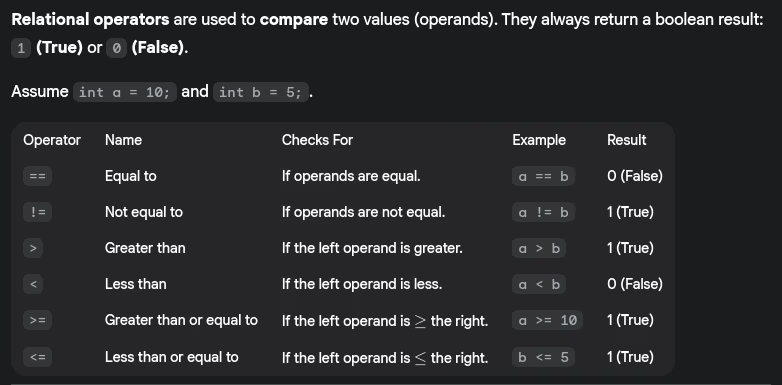
- What are logical operators and how do they work?
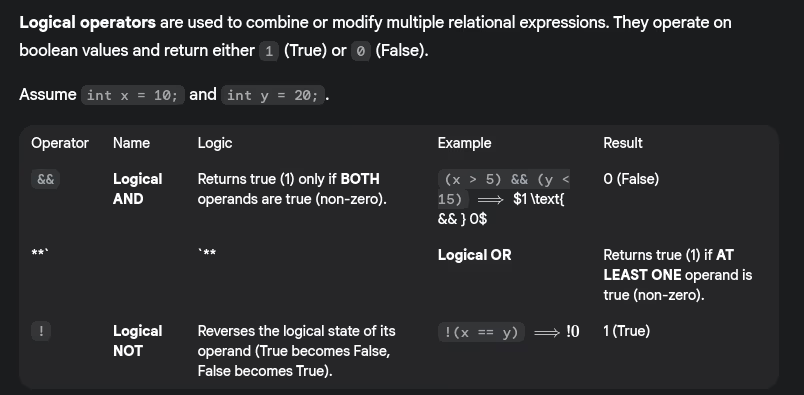
- What is short-circuit evaluation in logical operators?
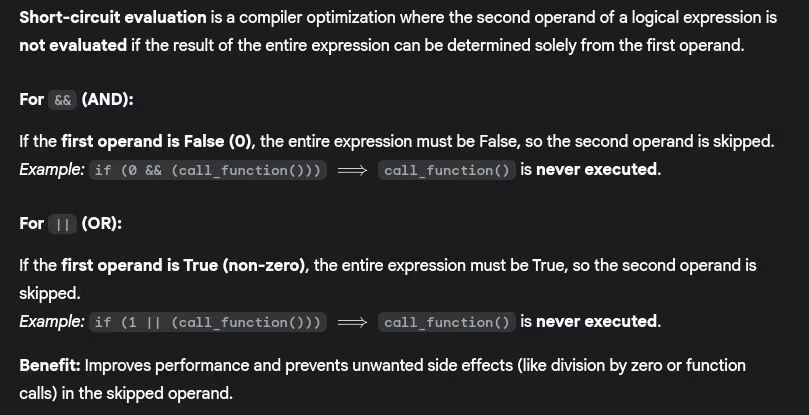
- How does the conditional (ternary) operator work?simplilearn
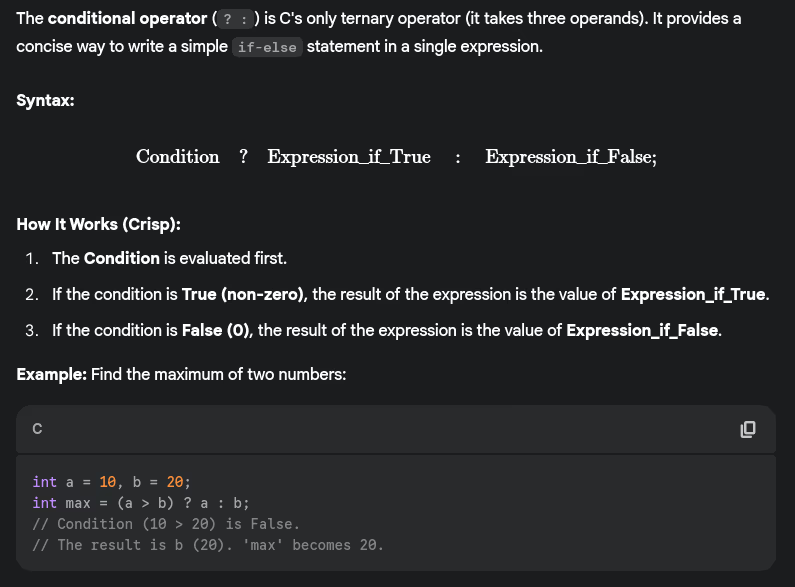
Bitwise Operators
- Explain all bitwise operators (
&, |, ^, ~, <<, >>) with examples.geeksforgeeks+2 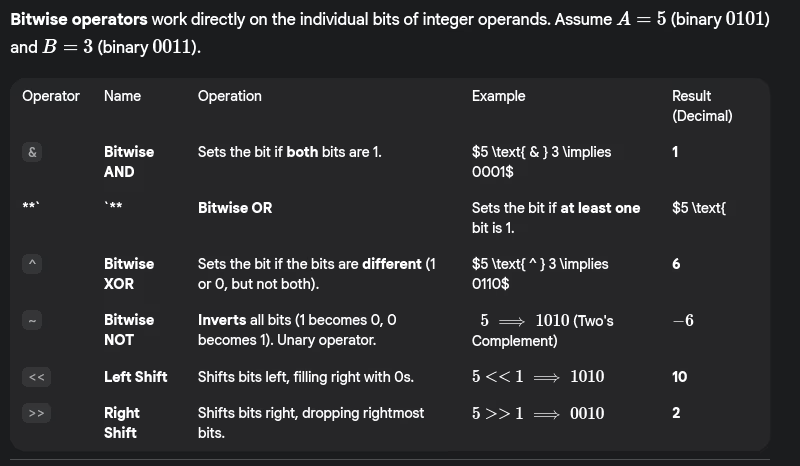
- How do you set, clear, and toggle specific bits in a number?devinterview+2

- Write a program to check if a number is a power of 2 using bit manipulation.interviewkickstart+1

- How do you swap two numbers using XOR operation?geeksforgeeks
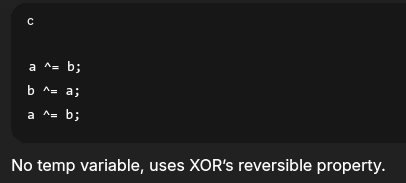
- What is bit masking and when is it used?

- How do you count the number of set bits in an integer?
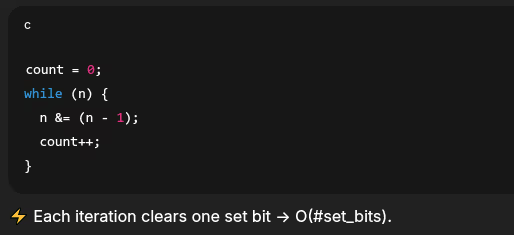 geeksforgeeks+1
geeksforgeeks+1
- How do you check if two integers have opposite signs using bitwise
 operations?aticleworld
operations?aticleworld
- Explain bit shifting operations and their applications.devinterview

- How do you multiply or divide a number by powers of 2 efficiently?

Control Structures
Conditional Statements
- Explain if, if-else, and nested if statements with examples.
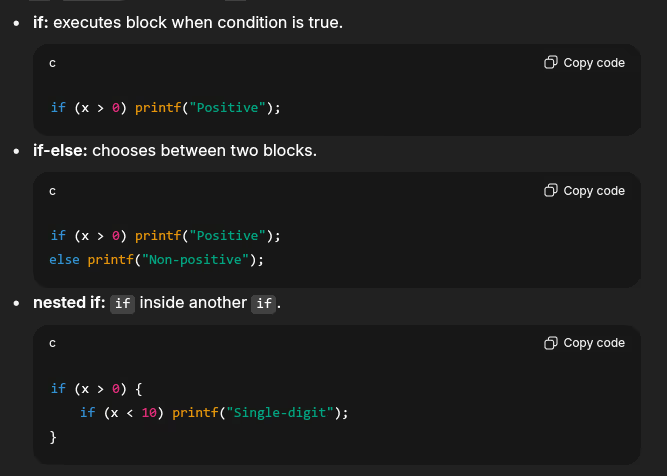
- How does the switch statement work? What are its limitations?
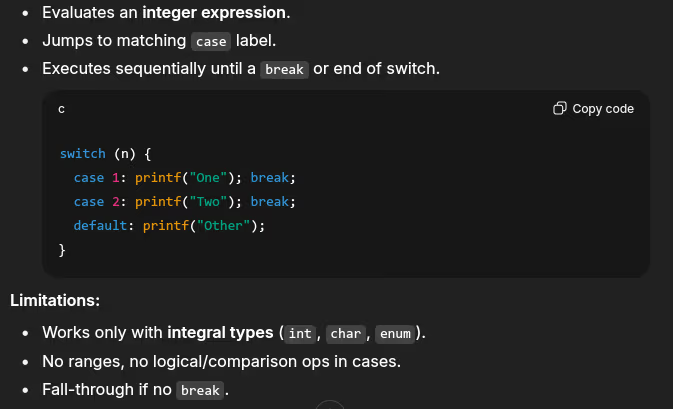
- When should you use switch vs if-else statements?

- What is the default case in switch statements?

- Can you use floating-point numbers in switch statements?

Loops
- Explain for, while, and do-while loops with examples.
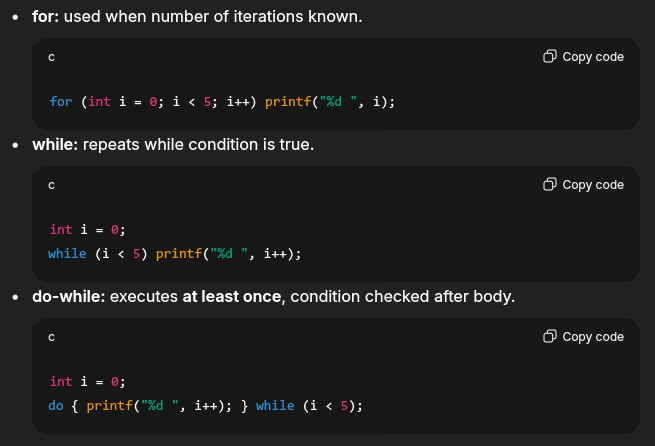
- What is the difference between entry-controlled and exit-controlled loops?simplilearn

- How do break and continue statements work?
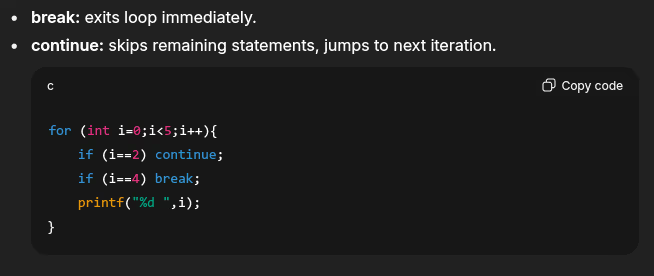
- What are nested loops and when are they used?

- How do you create an infinite loop and when might it be useful?

Jump Statements
- Explain goto statement and why it should be avoided.
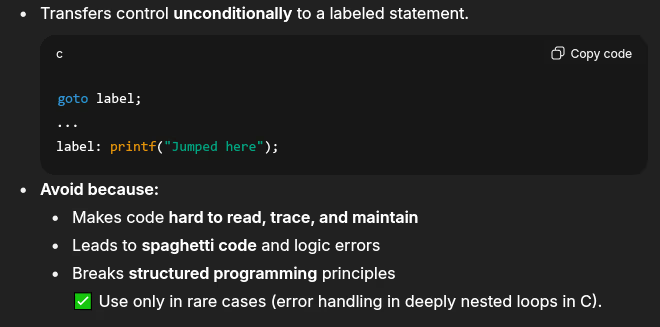
- What are the uses of break, continue, and return statements?

- Can you use goto to jump into a loop or out of a function?

Functions
Function Basics
- What are functions in C? Why are they important?
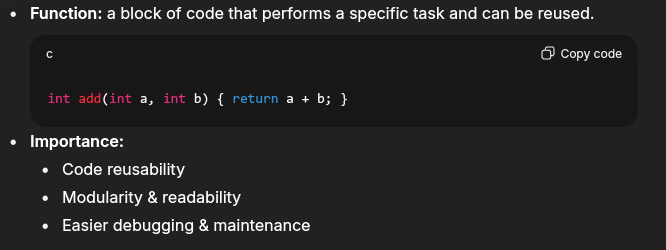
- How do you declare and define a function?
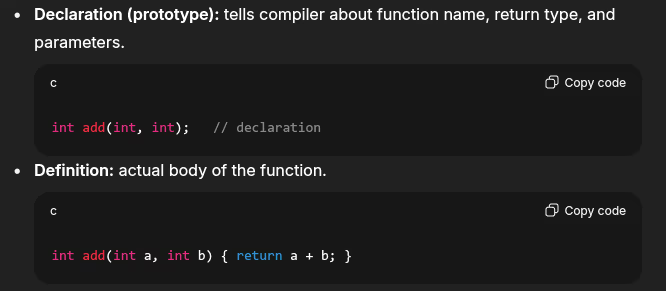
- What is function prototyping and why is it necessary?simplilearn

- What happens if you don’t declare a function prototype?

- Can you call a function before its definition?

Function Parameters and Return Values
- What is the difference between parameters and arguments?
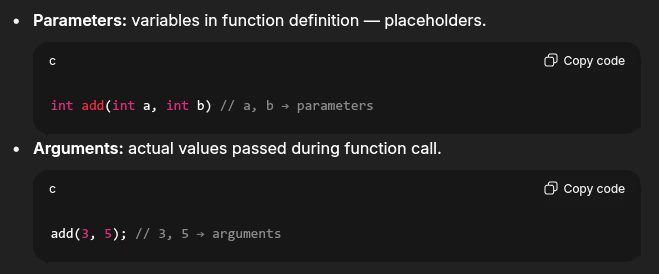
- Explain call by value vs call by reference.youtubesimplilearn
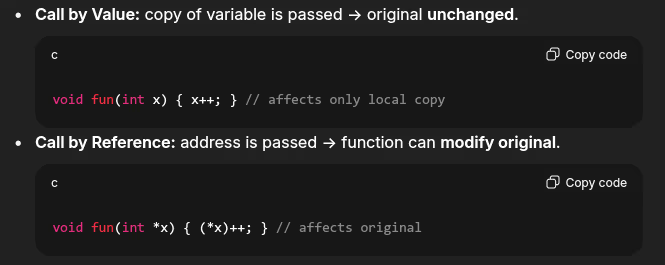
- How do you return multiple values from a function?
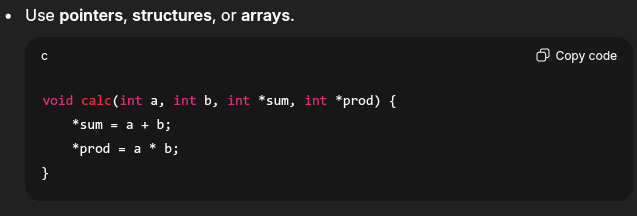
- What happens if you don’t specify a return type for a function?

- Can a function return a pointer or an array?

Special Function Types
- What are inline functions and how do they differ from macros?
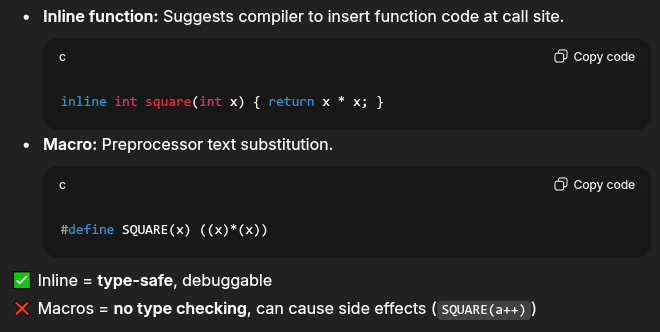
- What are function pointers and how do you use them?vervecopilot
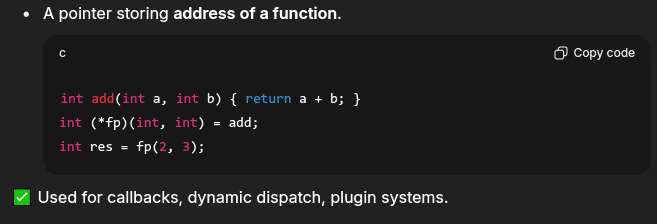
- Write a program demonstrating function pointers for a calculator.
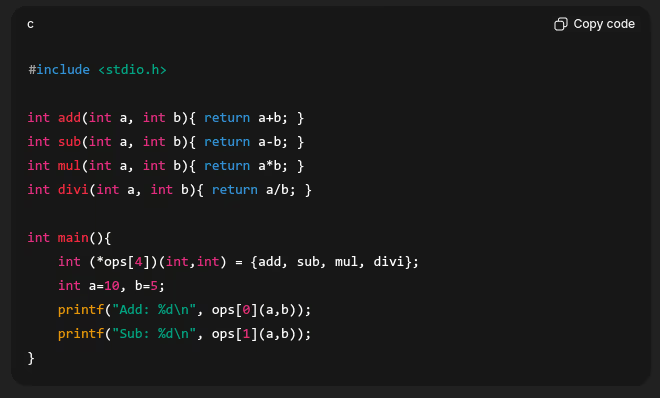
- What are callback functions?
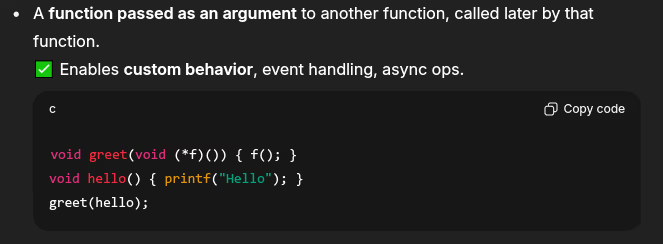
- How do you pass a function as an argument to another function?
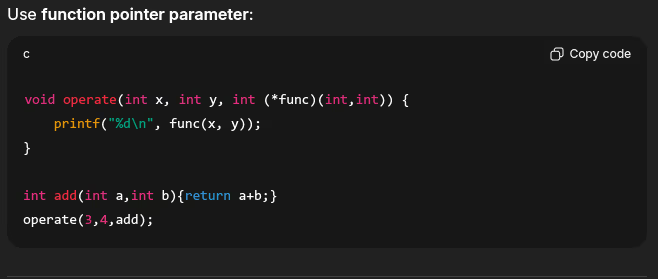
Recursion
- What is recursion? Provide examples.b2bcampus+1

- What are the advantages and disadvantages of recursion?
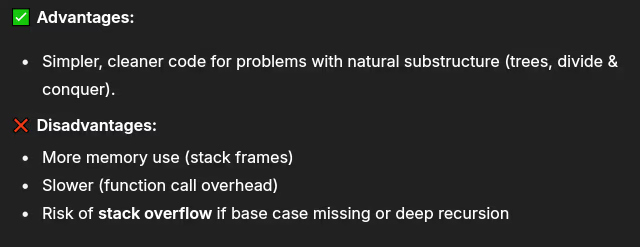
- How does recursion use the call stack?

- What is tail recursion and how can it be optimized?
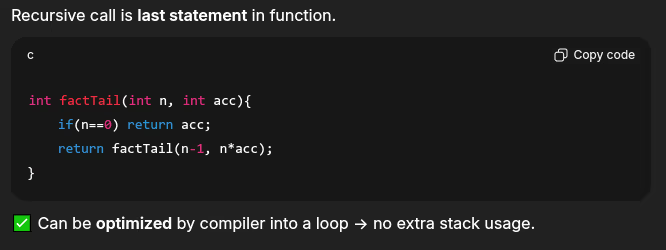
- What causes stack overflow in recursive functions?

Variable Arguments
- How do you create functions with variable number of arguments?

- Explain
stdarg.h library functions (va_start, va_arg, va_end).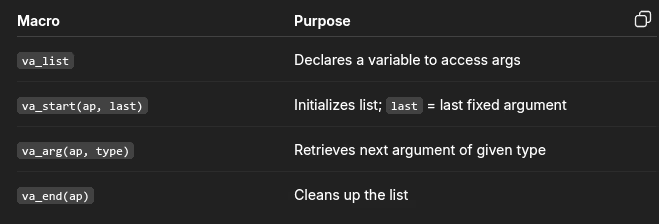
- Write a function that finds the sum of variable number of integers.
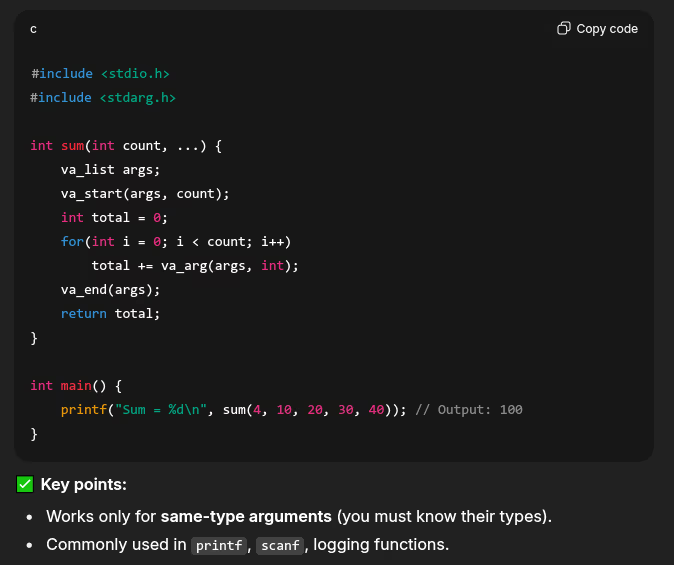
Arrays and Strings
Array Fundamentals
- What is an array? How do you declare and initialize arrays?

- What is the relationship between arrays and pointers?

- How do you pass arrays to functions?

- What are the limitations of arrays in C?

- How do you find the size of an array using
sizeof? 
Multidimensional Arrays
- How do you declare and use multidimensional arrays?simplilearn

- How are 2D arrays stored in memory (row-major vs column-major)?

- How do you pass 2D arrays to functions?

String Handling
- How are strings represented in C?

- What is the difference between
char *str and char str[]? 
- Explain important string functions (
strlen, strcpy, strcat, strcmp). 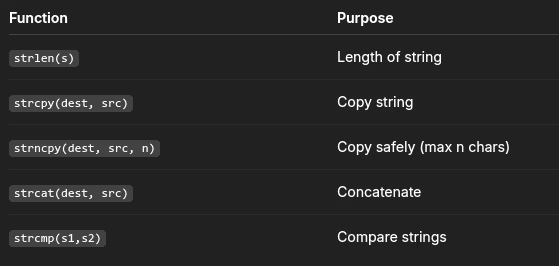
- How do you copy a string safely to avoid buffer overflow?vervecopilot

- What are the security implications of functions like
gets() and strcpy()?
Pointers and Memory Management
Pointer Fundamentals
- What is a pointer? How do you declare and initialize pointers?finalroundai+1

- What is the difference between a pointer and a variable?finalroundai

- How do you access the value at a pointer (dereferencing)?

- What happens when you dereference a NULL pointer?guvi

- What are the common uses of pointers?geeksforgeeks

Pointer Arithmetic
- Explain pointer arithmetic with examples.aticleworld+1

- How do you use pointer arithmetic to traverse arrays?finalroundai

- What happens when you add or subtract integers from pointers?

- Can you perform arithmetic operations between two pointers?

Advanced Pointer Concepts
- What are void pointers and when are they used?intervue+1

- What is a pointer to a pointer? Provide examples.finalroundai

- What are function pointers and how do you use them?

- How do you create and use arrays of pointers?

- What are pointers to arrays vs arrays of pointers?

Pointer Problems and Pitfalls
- What are dangling pointers and how do they occur?toptal+2

- What are memory leaks and how do you prevent them?intervue+1youtube

- What is a wild pointer?

- What are the common mistakes when using pointers?finalroundai

- How do you debug pointer-related issues?

Dynamic Memory Allocation
- Explain
malloc(), calloc(), realloc(), and free() functions.interviewkickstart+1 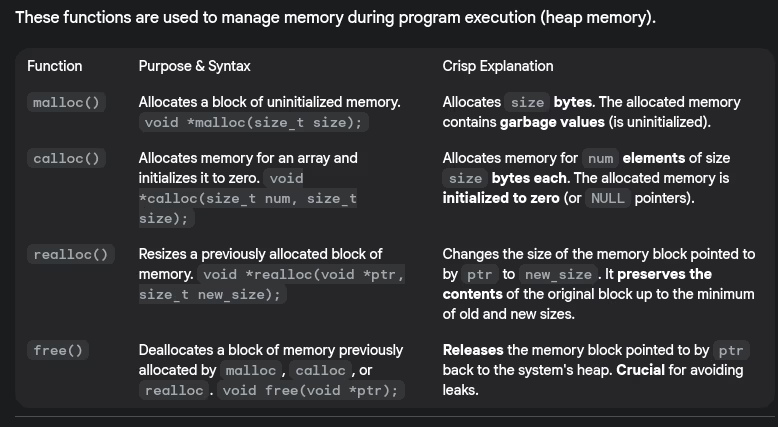
- What is the difference between
malloc() and calloc()?aticleworld+1
- When should you use
malloc() vs calloc()?aticleworld 
- How do you handle memory allocation failures?

- What happens if you forget to call
free()?interviewkickstart
- How do you resize dynamically allocated memory?interviewkickstart

- What are memory leaks and how do you detect them?interviewkickstart

- Write a program to create a dynamic array and perform operations on it.
 finalroundai
finalroundai
- How do you implement a dynamic string?

Memory Management Best Practices
- What are the best practices for memory management in C?aticleworld

- How do you avoid double free errors?

- What tools can help detect memory leaks?

- How do you implement custom memory allocators?

Structures, Unions, and Enumerations
Structures
- What is a structure? How do you define and use structures?

- How do you access structure members?

- What is the difference between
. and -> operators?
- How do you pass structures to functions?

- Can you return a structure from a function?

- What is a nested structure?

- How do you create an array of structures?

Structure Memory Layout
- What is structure padding and alignment?guvi

- How does the compiler decide on padding in structures?

- How can you minimize structure padding?

- What is
#pragma pack and when is it used?
- How do you calculate the size of a structure?

Unions
- What is a union and how does it differ from a structure?

- When should you use unions instead of structures?

- How do you safely access union members?

- What is an anonymous union?

- Can you have structures within unions and vice versa?

Enumerations
- What are enumerated types (enums) and why are they useful?

- How do you define and use enums?

- What are the underlying values of enum constants?

- Can you assign custom values to enum constants?

Advanced Structure Concepts
- How do you create self-referential structures?

- What are bit fields in structures and when are they used?vervecopilot

- How do you implement linked lists using structures?

- What are flexible array members in structures?
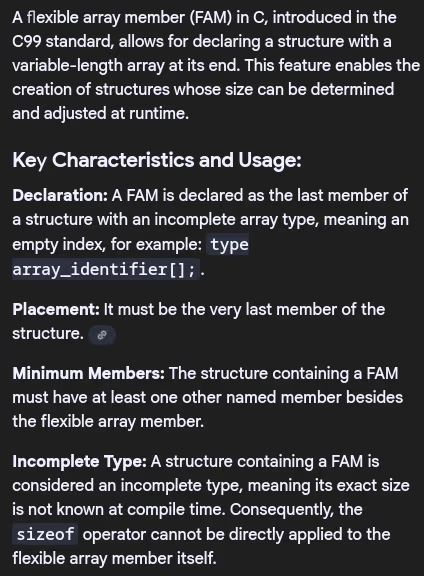
File Handling
File Operations Basics
- Explain
fprintf(), fscanf(), fgets(), and fputs() functions.geeksforgeeks
- What is the difference between
fgetc() and getc()?
- How do you read and write binary data to files?geeksforgeeks

File Positioning Functions
- Explain
fseek(), ftell(), and rewind() functions.cppbuzz+1
- How do you move the file pointer to a specific position?

- What is the difference between
fseek() and rewind()?letsfindcourse
- How do you get the current position of the file pointer?

File Handling Problems
- How do you read a file line by line?w3resource

- How do you handle errors in file operations?

Advanced File Concepts
- What is the difference between buffered and unbuffered I/O?

- How do you flush file buffers?

- What are standard input, output, and error streams?letsfindcourse

- How do you redirect input and output in C programs?

Preprocessor Directives
Basic Preprocessor Directives
- What is the preprocessor and when does it run?

- Explain
#include, #define, and #undef directives.
- What is the difference between
#include <file> and #include "file"? vervecopilot
vervecopilot
- How do you create and use header files?

Macros
- What are macros and how do they differ from functions?vervecopilot

- What are the advantages and disadvantages of macros?

- How do you create function-like macros?

- What are the potential pitfalls of using macros?

- Write a macro to find the maximum of two numbers.

Conditional Compilation
- Explain
#ifdef, #ifndef, #if, #else, and #endif directives.data-flair
- How do you use conditional compilation for debugging?data-flair

- What are header guards and why are they important?

- How do you create platform-specific code using preprocessor directives?

Advanced Preprocessor Features
- What are
#pragma directives and when are they used?
- Explain
#error and #warning directives.
- What are predefined macros like
__FILE__, __LINE__, __DATE__?
- How do you create variadic macros?

Advanced C Programming Concepts
Storage Classes
- Explain different storage classes:
auto, register, static, extern.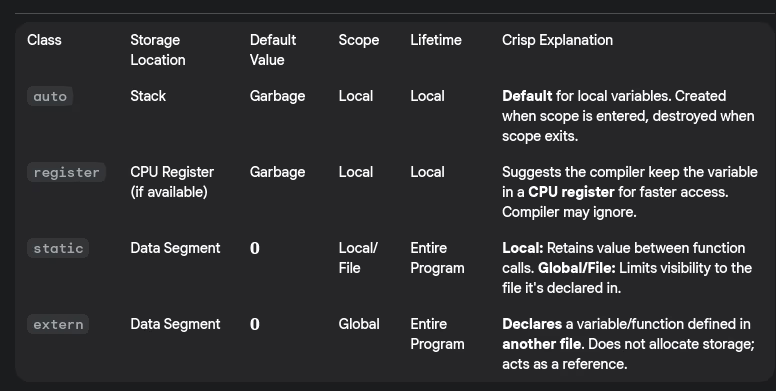 vervecopilot+1
vervecopilot+1
- What is the difference between local and global variables?

- How does the
static keyword affect variables and functions?vervecopilot
- When should you use the
register storage class?
- What is the scope and lifetime of different storage classes?

Type Qualifiers
- What is the
const qualifier and how do you use it?vervecopilot
- What is the
volatile keyword and when is it necessary?simplilearn+1
- Can you modify a
const variable indirectly through pointers?
- What are
restrict and _Atomic qualifiers?
Advanced Data Types
- What is
typedef and why is it useful?vervecopilot
- How do you create complex data types using typedef?

- What are incomplete types in C?

- How do you work with void pointers safely?

- What are variadic functions and how do you implement them? Variable Arguments
- How do you implement function overloading in C?

- What are nested functions and do they exist in C?

- How do you implement closures in C?
System Programming and Low-Level Concepts
Memory Layout and Management
- Explain the memory layout of a C program (code, data, heap, stack).
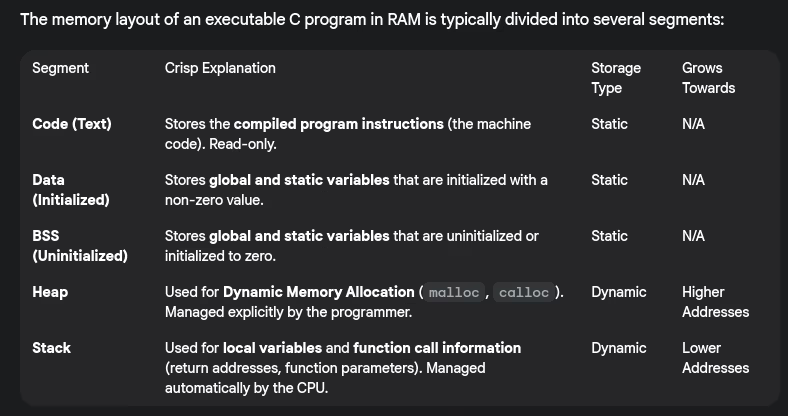 geeksforgeeks+1
geeksforgeeks+1
- What is the difference between stack and heap memory?guvi+1
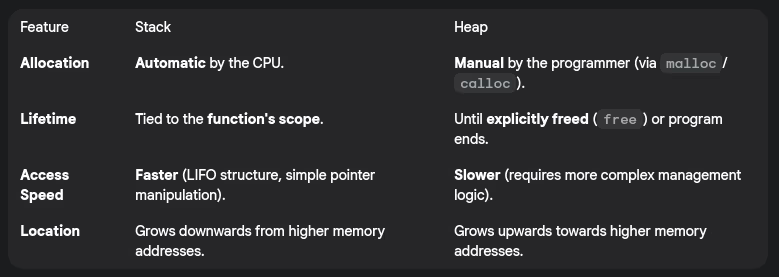
- How does the call stack work?

- What causes stack overflow and heap overflow?

- How do you detect and prevent buffer overflows?vervecopilot

Endianness And Data Representation
- What is endianness (big-endian vs little-endian)?
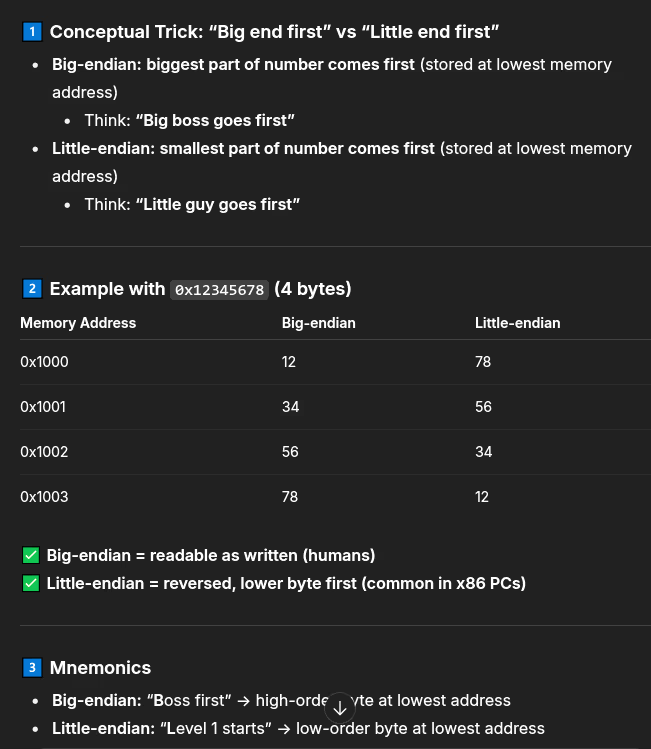
- How do you check the endianness of a system?

- How are negative numbers represented in C (two’s complement)?

- What is the IEEE 754 standard for floating-point representation?

System Calls and Library Functions
- What is the difference between system calls and library functions?

- How do you make system calls from C programs?

- What are some common POSIX functions?

- How do you handle signals in C programs?

- What are the common optimization techniques in C?
- How do you profile C programs to find performance bottlenecks?
- What is the role of compiler optimizations?

- How do you write cache-friendly code?
- What are the trade-offs between speed and memory usage?
Error Handling and Debugging
Common Errors and Debugging
- What are syntax errors, runtime errors, and logical errors?indeed+1
- What is a segmentation fault and how do you debug it?usebraintrust+1
- How do you debug a C program effectively?getsdeready+2
- What tools can you use for debugging C programs (GDB, Valgrind)?b2bcampus
- How do you use
assert() macro for debugging?data-flair
- What are buffer overflows and how do you prevent them?
- How do you detect memory leaks using tools?getsdeready
- What are use-after-free errors and how do you avoid them?
- How do you debug double-free errors?
Best Practices for Error Prevention
- How do you write defensive code in C?
- What are coding standards and why are they important?
- How do you handle error conditions gracefully?
- What is the importance of code reviews in preventing errors?
Embedded and System-Level Programming
Embedded C Concepts
- What is Embedded C and how does it differ from standard C?finalroundai
- How do you program microcontrollers using C?finalroundai
- What are registers and how do you access them in C?finalroundai
- How do you implement interrupt service routines (ISRs)?finalroundai
- What is memory mapping in embedded systems?finalroundai
Real-Time Programming
- What are the challenges of real-time programming in C?
- How do you ensure deterministic behavior in C programs?
- What are watchdog timers and how do you implement them?
Hardware Interface Programming
- How do you interface with hardware devices using C?
- What are device drivers and how are they written in C?
- How do you implement communication protocols (UART, SPI, I2C)?finalroundai
Advanced Topics and Tricky Questions
Undefined Behavior and Implementation-Defined Behavior
- What is undefined behavior in C and why is it dangerous?guvi
- Provide examples of undefined behavior.guvi
- What is implementation-defined behavior?
- How do you write portable C code?
Tricky C Questions
- What is the value of the expression
5["abcdef"]?interviewbit
- Explain the behavior of
printf("%d");intervue
- What happens when you call
main() recursively?
- How do you print the symbol
% using printf()?intervue
- What is the output of
printf("GeeksQuiz"); without #include <stdio.h>?
Advanced Pointer Manipulations
- What are the different levels of pointer indirection?
- How do you create and use arrays of function pointers?
- What are const pointers vs pointers to const?
- How do you implement generic programming using void pointers?
Compiler And Linking Concepts
- What happens during the compilation process (preprocessing, compilation, assembly, linking)?
- What is the difference between compilation errors and linking errors?
- How do you create and use static and dynamic libraries?geeksforgeeks
- What are symbol tables and how do they work?
Interview Scenario and Coding Problems
Classic Programming Problems
- Write a program to check if a number is prime.geeksforgeeks+1
- Implement the Fibonacci sequence using different approaches.data-flair
- Write a program to find all prime numbers up to n (Sieve of Eratosthenes).
- Implement string manipulation functions (reverse, palindrome check, anagram detection).
- Write a program to convert decimal to binary and vice versa.finalroundai
Mathematical Problems
- Write a program to find GCD and LCM of two numbers.
- Implement integer square root without using library functions.
- Write a program to generate Pascal’s triangle.
- Implement matrix operations (addition, multiplication, transpose).
Pattern And Series Problems
- Write programs to print various number and star patterns.
- Generate arithmetic and geometric progressions.
- Print Pascal’s triangle, Floyd’s triangle.
Problem-Solving Scenarios
- How would you implement a memory pool allocator?
- Design a simple garbage collector for C.
- How would you implement a basic operating system scheduler?
- Design a simple interpreter for a mathematical expression evaluator.
Concurrency And Multi-threading
- How do you handle multi-threading in C programs?
- What are race conditions and how do you prevent them?
- What are mutexes, semaphores, and condition variables?
- How do you implement producer-consumer problems?
Network Programming
- How do you create client-server applications using sockets?
- What are the differences between TCP and UDP programming?
- How do you handle network byte order conversion?
- How do you measure the performance of C programs?
- What are cache misses and how do they affect performance?
- How do you optimize code for specific architectures?
- What is branch prediction and how does it affect performance?
Modern C Standards and Features
C99, C11, C18 Features
- What are the key features introduced in C99?
- What new features were added in C11?
- How do you use variable-length arrays (VLAs)?
- What are compound literals and designated initializers?
- How do you use the
_Generic keyword for type-generic programming?
Security Considerations
- What are buffer overflow attacks and how do you prevent them?
- How do you write secure C code?
- What are format string vulnerabilities?
- How do you validate input to prevent security issues?
Miscellaneous Questions
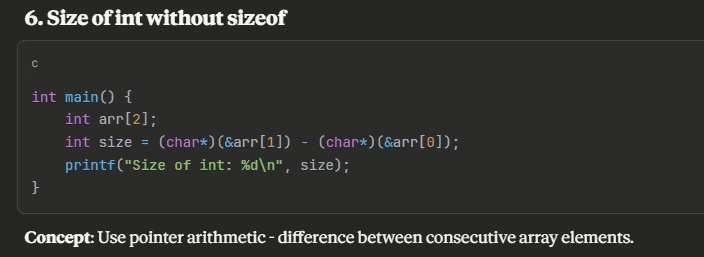
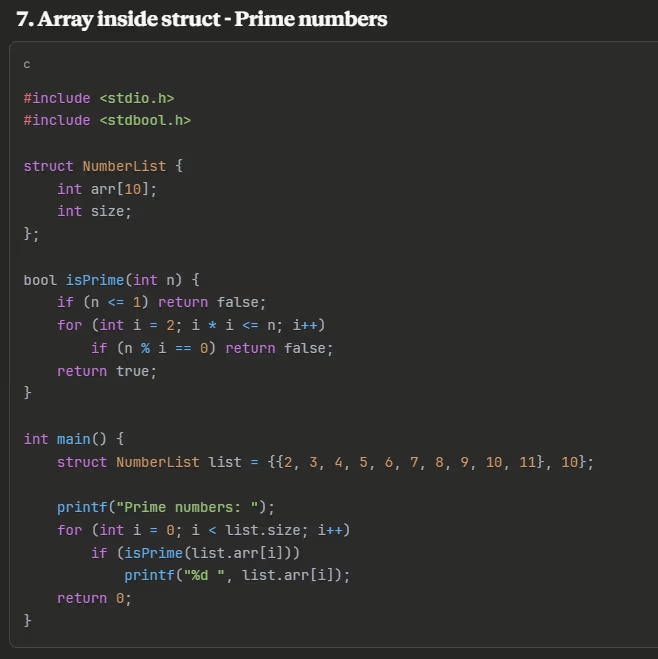
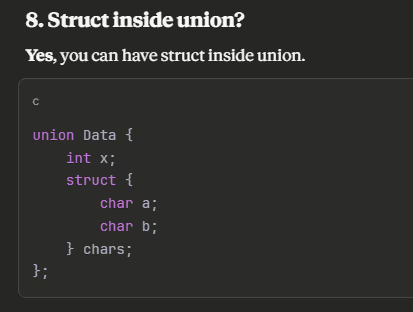

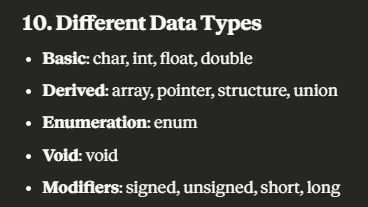

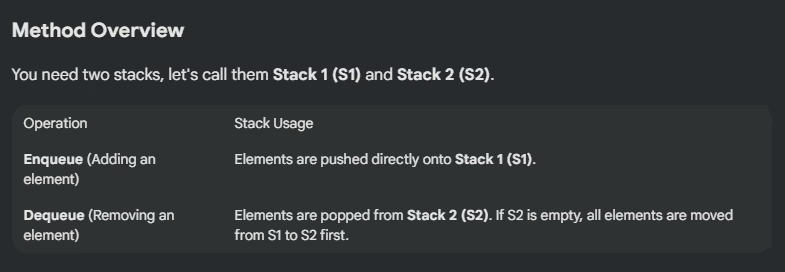
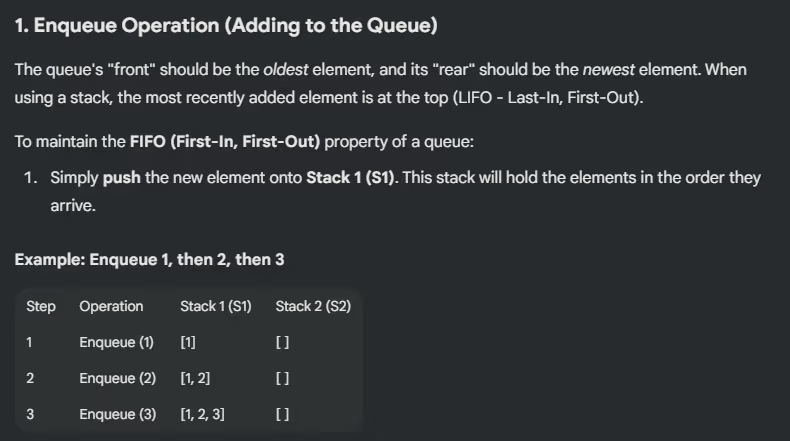
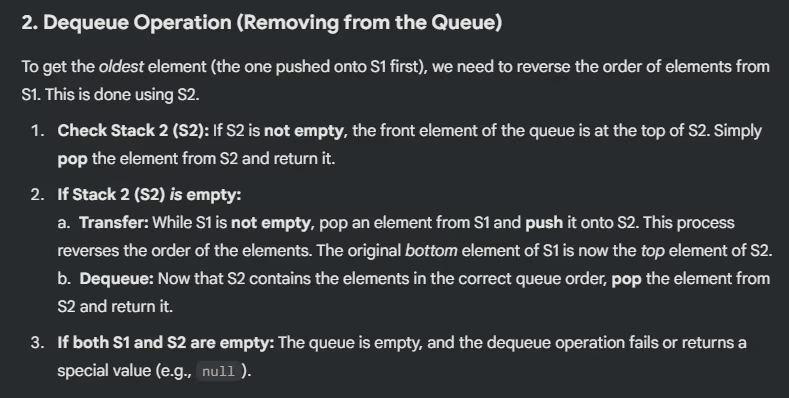
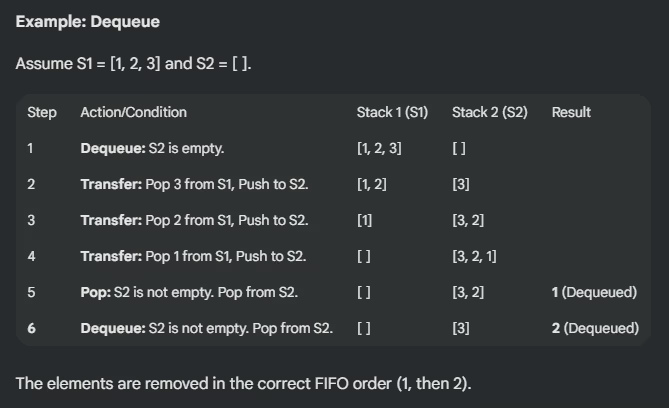
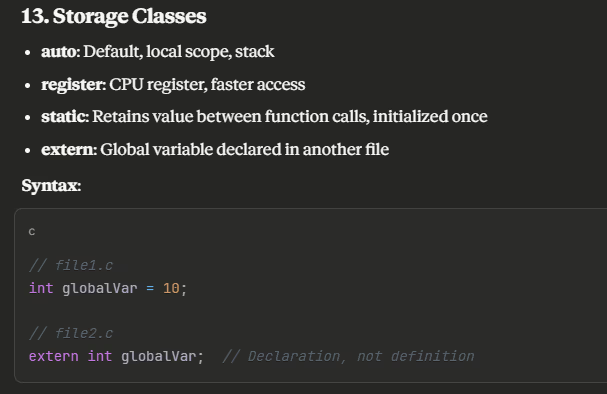


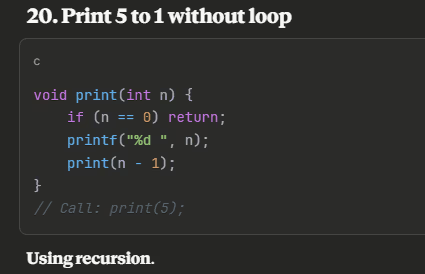
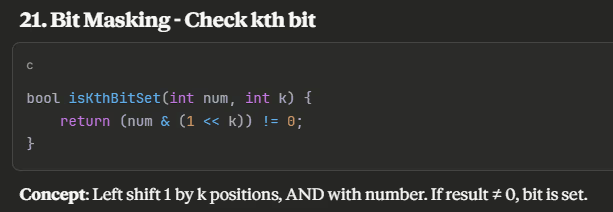
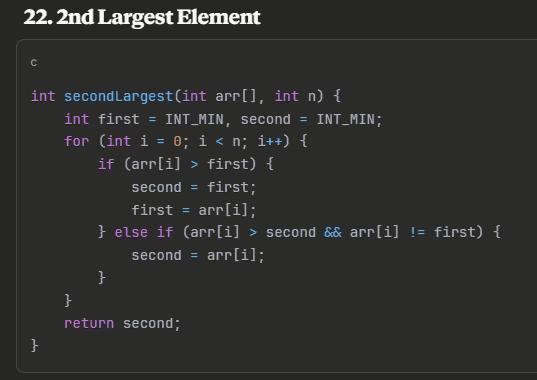

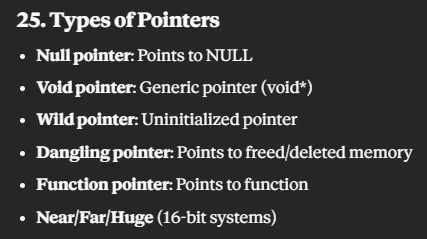

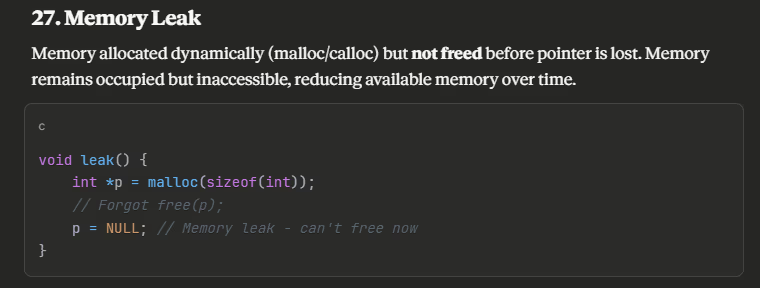
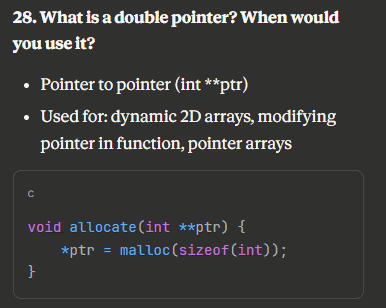
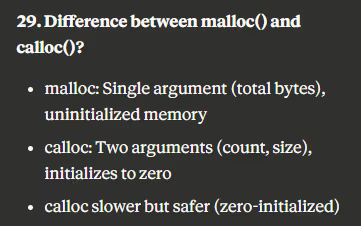
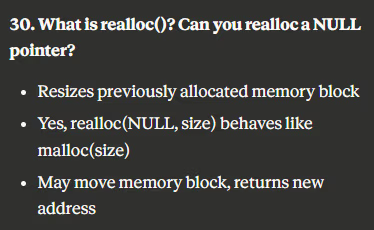
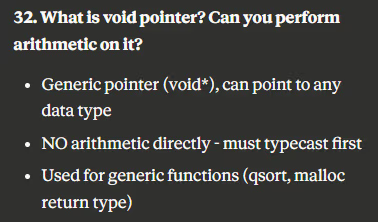
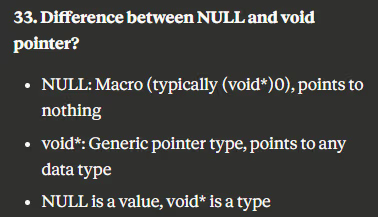
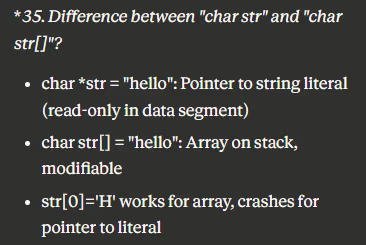
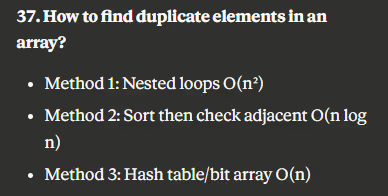
- right rotate array
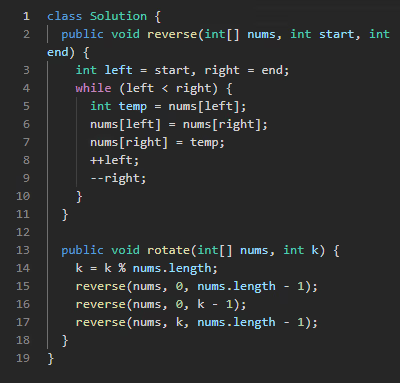
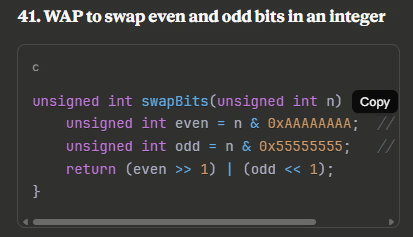
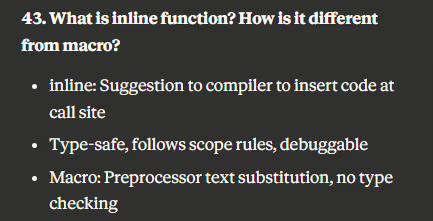
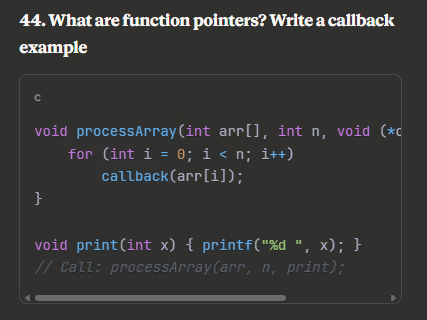
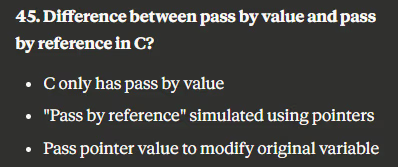
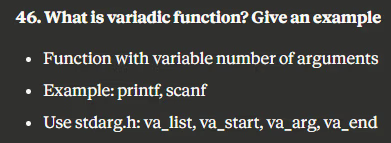
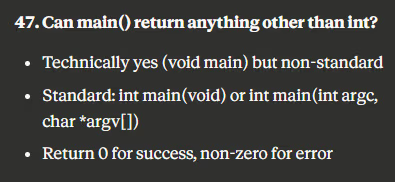
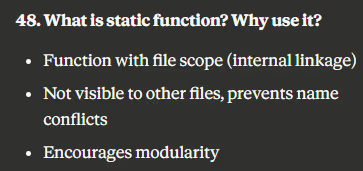
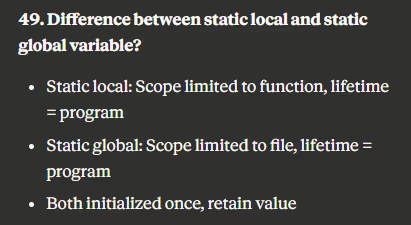
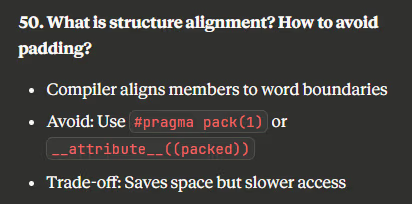
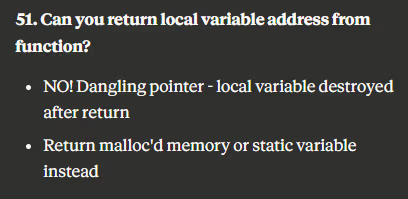
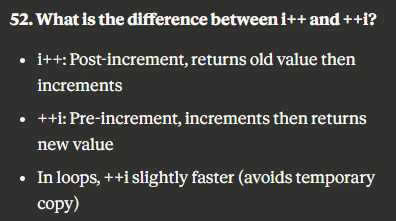
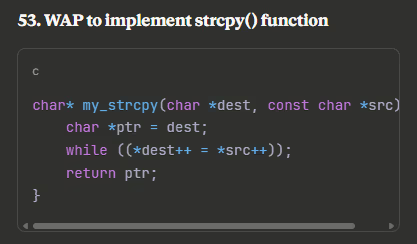
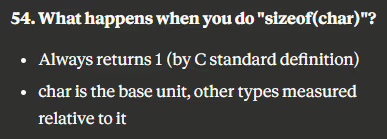
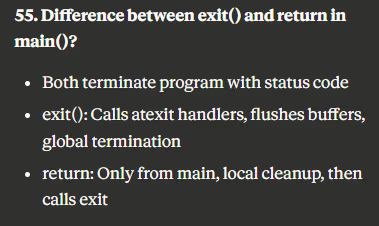
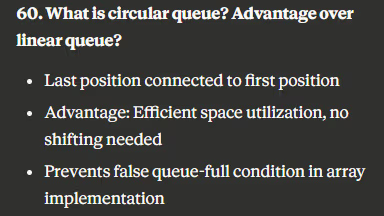
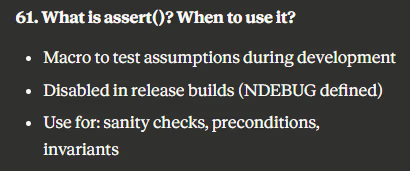
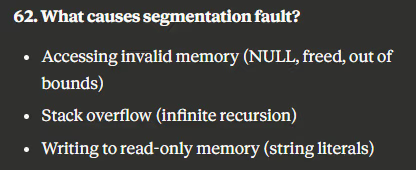
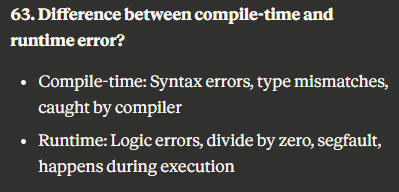
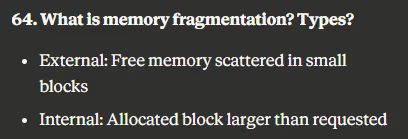
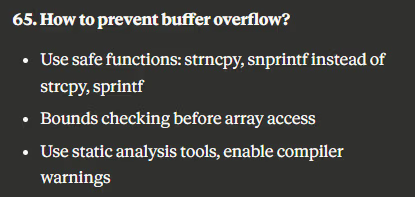
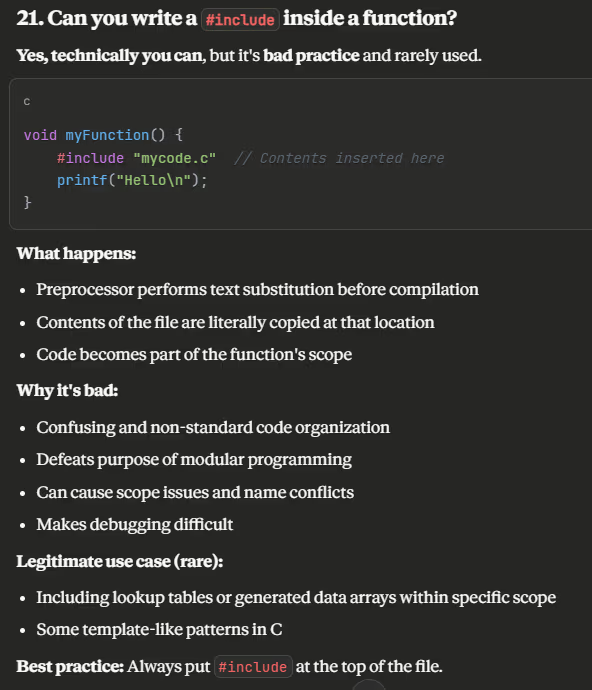
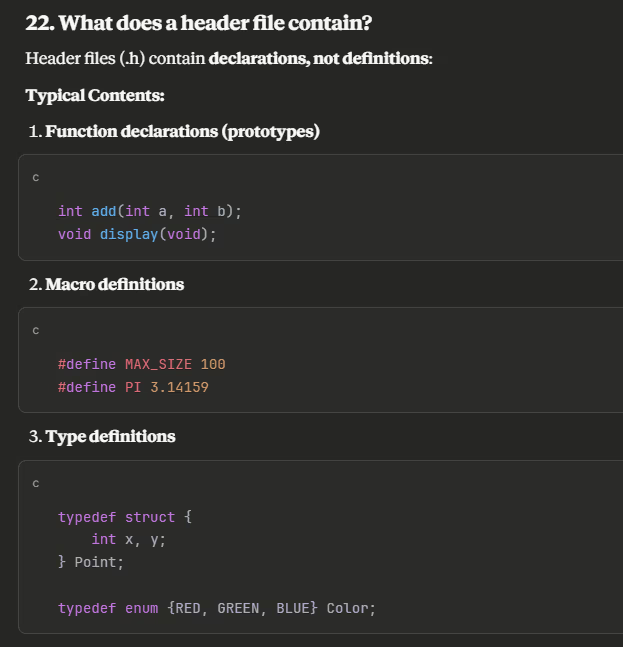
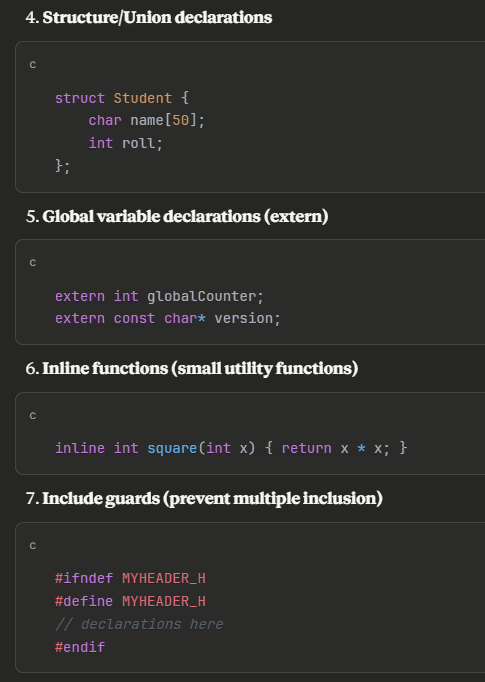
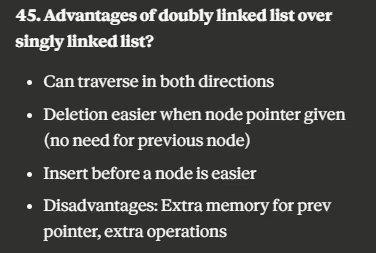
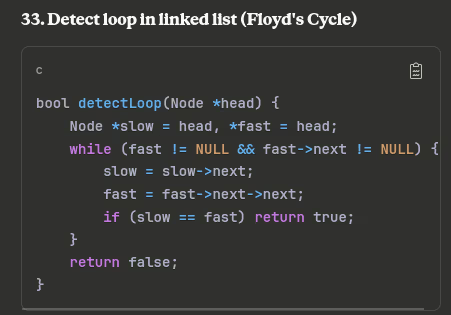
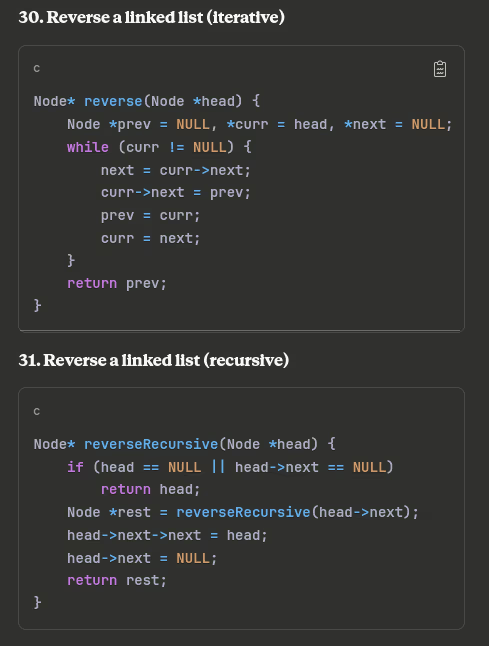
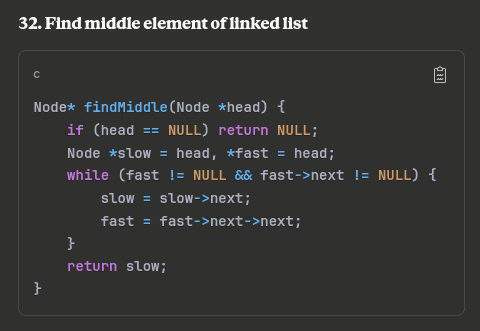
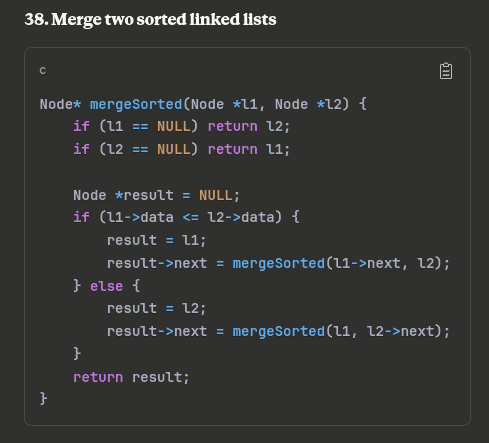
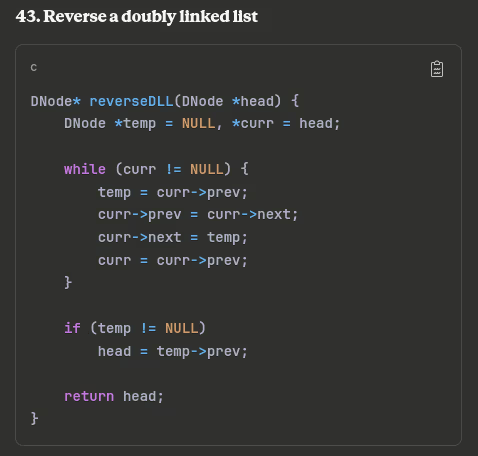
- stack using queue - costly push operation
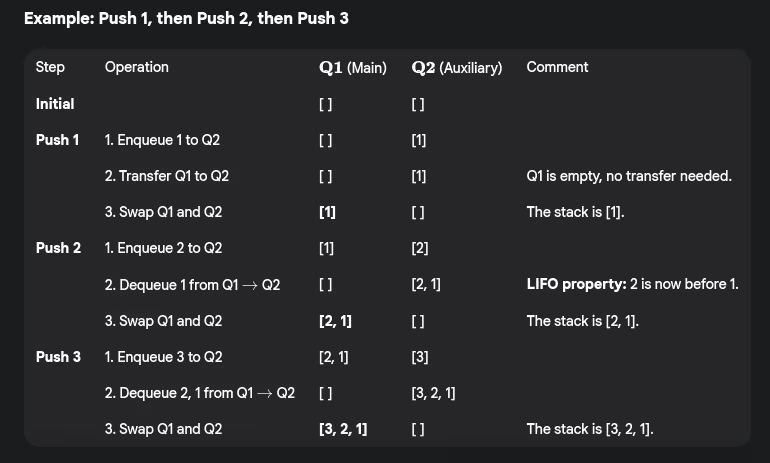
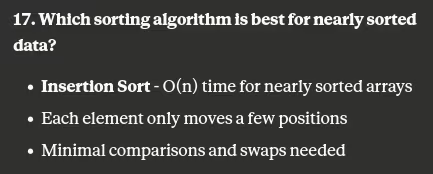
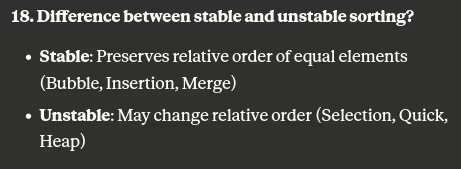
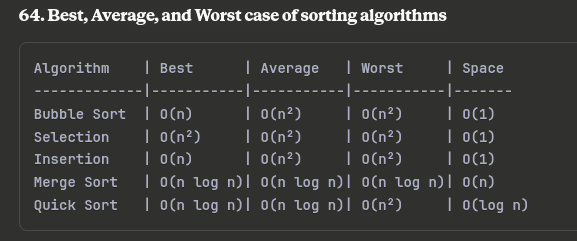













































 geeksforgeeks+1
geeksforgeeks+1 operations?aticleworld
operations?aticleworld












































































 finalroundai
finalroundai

















































 vervecopilot
vervecopilot













 vervecopilot+1
vervecopilot+1













 geeksforgeeks+1
geeksforgeeks+1













































































